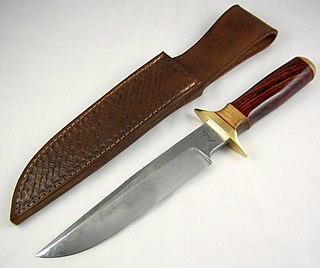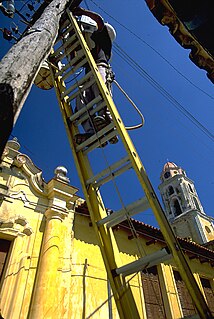Related Research Articles

A utility knife is any type of knife used for general manual work purposes. Such knives were originally fixed-blade knives with durable cutting edges suitable for rough work such as cutting cordage, cutting/scraping hides, butchering animals, cleaning fish scales, reshaping timber, and other tasks. Craft knives are small utility knives used as precision-oriented tools for finer, more delicate tasks such as carving and papercutting.

A knife is a tool or weapon with a cutting edge or blade, usually attached to a handle or hilt. One of the earliest tools used by humanity, knives appeared at least 2.5 million years ago, as evidenced by the Oldowan tools. Originally made of wood, bone, and stone, over the centuries, in step with improvements in both metallurgy and manufacturing, knife blades have been made from copper, bronze, iron, steel, ceramic, and titanium. Most modern knives have either fixed or folding blades; blade patterns and styles vary by maker and country of origin.

A ladder is a vertical or inclined set of rungs or steps.

Scissors are hand-operated shearing tools. A pair of scissors consists of a pair of metal blades pivoted so that the sharpened edges slide against each other when the handles (bows) opposite to the pivot are closed. Scissors are used for cutting various thin materials, such as paper, cardboard, metal foil, cloth, rope, and wire. A large variety of scissors and shears all exist for specialized purposes. Hair-cutting shears and kitchen shears are functionally equivalent to scissors, but the larger implements tend to be called shears. Hair-cutting shears have specific blade angles ideal for cutting hair. Using the incorrect type of scissors to cut hair will result in increased damage or split ends, or both, by breaking the hair. Kitchen shears, also known as kitchen scissors, are intended for cutting and trimming foods such as meats.

A peeler is a kitchen tool, a distinct type of kitchen knife, consisting of a metal blade with a slot with a sharp edge attached to a handle, used to remove the outer layer of some vegetables such as potatoes, broccoli stalks, and carrots, and fruits such as apples and pears. A paring knife may also be used to peel vegetables. The blade of a peeler has a slot with one side sharpened; the other side of the slot prevents the blade from cutting too far into the vegetable.
Jacob's Ladder is a staircase to heaven from a dream of Jacob described in the Old Testament.

A butterfly knife, also known as a Balisong, fan knife or Batangas knife, is a type of folding pocketknife that originated in the Philippines. Its distinct features are two handles counter-rotating around the tang such that, when closed, the blade is concealed within grooves in the handles. A latch holds the handles together, typically mounted on the one facing the cutting edge.
A gravity knife is a knife with a blade contained in its handle, and that opens its blade by the force of gravity. This mechanism of opening is fundamentally different from the switchblade, which extends its spring-propelled blade automatically upon the push of a button, switch, or fulcrum lever. The main purpose of gravity opening is that it allows opening and closing to be done one handed, in situations where the other hand is occupied. Hence, historically they have been issued to parachutists to cut off caught lines, such as lines tangled in trees, a major potential use of the gravity knife.

A bottle opener is a device that enables the removal of metal bottle caps from glass bottles. More generally, it might be thought to include corkscrews used to remove cork or plastic stoppers from wine bottles.

The Opinel company has manufactured and marketed a line of eponymous wooden-handled knives since 1890 from its headquarters in Saint-Jean-de-Maurienne, Savoie, France where the family-run company also operates a museum dedicated to its knives. The company sells approximately 15 million knives annually. Opinel knives are made of both high carbon and stainless steel, the latter being Sandvik steel from Sweden.

The penny knife was a originally a simple 18th century utility knife with a fixed blade. It got the name penny knife because it cost 1 penny in England and America towards the end of the 18th century.

Strider Knives, Inc. is a custom and production knifemaking facility headed by Mick Strider based in San Marcos, California.

A kitchen knife is any knife that is intended to be used in food preparation. While much of this work can be accomplished with a few general-purpose knives – notably a large chef's knife, a tough cleaver, a small paring knife and some sort of serrated blade – there are also many specialized knives that are designed for specific tasks. Kitchen knives can be made from several different materials.

Christopher Stanley Reeve is a South African-American knife maker, recognized as one of the most influential people in knife making history. Reeve founded Chris Reeve Knives (CRK) in 1984. In 2014, Reeve retired and was inducted into the Blade Magazine Hall of Fame in 2015.

The Sebenza is a folding pocket knife manufactured by Chris Reeve Knives of Boise, Idaho. It is constructed with a stainless steel blade and titanium handle. Its handle functions as the lock mechanism similar in concept to the Walker linerlock differing in that the handle itself forms the lock bar which holds the blade open. This mechanism was invented by Chris Reeve, and is called the Reeve Integral Lock (R.I.L). It is also commonly referred to as the Framelock, and is one of the most widely implemented locking systems in the folding knife industry, where lock strength and reliability is a product requirement. The name Sebenza is derived from the Zulu word meaning "Work," a tribute to Mr. Reeve's South African origins.

The Umnumzaan is a folding pocket knife manufactured by Chris Reeve Knives of Boise, Idaho, and designed by Chris Reeve. The name "Umnumzaan" is derived from the Zulu language, meaning "Head of the family," or "Boss" (colloq.), a tribute to Mr. Reeve's South Africa origins. The Umnumzaan was designed to meet the needs of operators seeking a heavy-duty folder capable of handling heavy use and even abuse. Building upon the Sebenza’s success, the Umnumzaan features: a stronger pivot joint, a thicker blade, a different blade grind with a reinforced tip, improved ergonomics, thicker titanium handles, a thicker titanium lock bar, a stronger ceramic ball detent system, a larger titanium spacer, a phosphor-bronze washer system designed to act as a ‘dry-sump’ to retain lubrication and keep dirt out, an oversized ambidextrous-thumb studs & extended lock bar to aid operation when wearing gloves, a lanyard pivot joint that uses pivoting lanyard tie bars, and a deeply textured grip.

A grapefruit knife is a special type of knife designed specifically for cutting grapefruit. Grapefruit knives are small with a curved serrated blade, designed to hug the curves of the grapefruit. This is used to separate the outer edge of the segments from the rim of the fruit. The term "grapefruit knife" can refer to a type of knife with short, serrated twin blades about 2mm apart, used to separate the sides of each section from the dividing membrane. Some grapefruit knives incorporate both types, a double-sided curved blade on one side and the parallel twin blades on the other. Another type includes an angled tip and double sided serrated blade. When both types are used, the result is an intact-looking fruit with sections which lift out easily - especially if a "grapefruit spoon" is used.
Chris Reeve Knives is an American knife manufacturing corporation with international sales and distribution headquartered in Boise, Idaho, that designs, develops, and sells folding pocket knives and fixed-blade knives. Its products include the Sebenza, Inkosi, Umnumzaan, TiLock, Mnandi folding knives, Impinda slip joint, and the Green Beret, Pacific, Professional Soldier, Nyala, and Sikayo fixed blade knives. Chris Reeve Knives' industry contributions include the Integral Lock, contributions to the blade steels CPM-S30V and CPM-S35VN, and has won Blade Magazine's Blade Show Manufacturing Quality Award 15 times. Their motto is Think Twice, Cut Once.

Columbia River Knife & Tool, Inc. (CRKT) is an American knife company established in 1994, and currently based in Tualatin, Oregon, United States. The company's president and sales executive is Rod Bremer and the finance executive is Peggy Bremer.
References
- 1 2 Suermondt, Jan (2004). Illustrated Guide to Knives . Grange Books. p. 24. ISBN 978-1-84013-694-4.
- ↑ "Best Tactical Pocket Knife For EDC". outdoorsmagazine.net. Retrieved 2011-11-14.